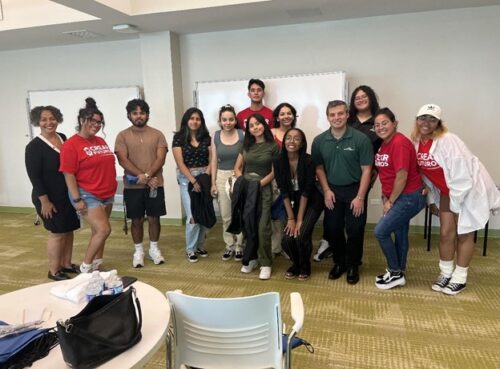While there are various ways to obtain an education at SUNY Old Westbury, distance learning appears to be increasing in the number of course offerings. The school’s population of approximately 4,000 students are given the option of taking courses in classes on campus, online, and hybrid classes. While online courses are completed entirely at home, hybrid courses combine online coursework with scheduled on-campus classes. There is no added surcharge or tuition difference between these three class types.
In the Spring 2014 semester, Old Westbury offered 28 online courses, and 8 hybrids, far less than the 19 online classes and 57 hybrids offered this semester. While the strictly online courses decreased, the number of hybrid classes increased substantially. Overall, a total of 40 distance learning courses were added to Old Westbury’s curriculum in just two years.
The school’s director of distance learning, Dr. Edward Bever, stated “we’re planning to schedule 30 online classes this coming summer, so the trend is clearly up.”
“In blended learning, ‘face time’ between students and teachers is not replaced by online course delivery,” according to the Panopto web site. “Rather, the online component of the learning experience usually consists of exercises or additional content that complement the in-class lesson.
“In hybrid learning, a significant portion of the course takes place online. In contrast with blended learning, a hybrid learning scenario replaces much of the student-teacher ‘face time’ in a brick-and-mortar location with online interaction.”
Not all majors at Old Westbury offer an equal amount of hybrid and online courses. American Studies students were given the opportunity to participate in the greatest amount of distance courses this semester with a total of seven hybrid courses, six blended, and one Net.
While philosophy and business majors each offered 11 distance learning courses, the School of Education did not have any. These numbers vary are a result of some majors requiring more classroom experience than others.
According to Oldwestbury.edu, online learning was created for “the convenience of anytime, anywhere learning with the quality of Old Westbury academics provides a convenient, accessible means to higher education for students who seek or require it.”
Old Westbury junior Jason Safuto agrees, “Online learning has helped me be able to continue my education and work at the same time. I really wish this school would offer even more.”
Education major Rosita Vasquez agrees, “Online courses are a great advantage as long as the student is disciplined and keeps up with the work.”
OW student, Lauren Alexander feels that “Hybrid classes offer the best of both worlds. I get to sit at home and do my work, while still being able to interact with other students face to face.”
These hybrid courses offer a balance between in class and online study by requiring students to attend one class meeting a week and completing the other via Blackboard.
But many students are opposed to distance learning.”I have taken two online classes. One at my previous college, and one here at Westbury,” sophmore Jamie Burks said. “Both times the teachers were so unorganized, I could not wait for them to be over.”
After taking two hybrid courses, senior Mike Alperin was left with mixed feelings regarding distance learning. “Like any class, I think your experience really depends on the professor,” he said. “I had one great class and one that was absolutely horrible.”
“A truly memorable college class, even a large one, is a collaboration between teacher and students,” writes Mark Edmundson, a professor of English at the University of Virginia, in the New York Times. “It’s a one-time-only event. Learning at its best is a collective enterprise, something we’ve known since Socrates. You can get knowledge from an Internet course if you’re highly motivated to learn. But in real courses the students and teachers come together and create an immediate and vital community of learning. A real course creates intellectual joy, at least in some. I don’t think an Internet course ever will. Internet learning promises to make intellectual life more sterile and abstract than it already is — and also, for teachers and for students alike, far more lonely.”
While Bever is a strong advocate of online learning, he also acknowledges the disadvantages that come along with this course type. “The subtle interplay of expression, tone of voice, and body language aren’t there, which is particularly important when someone doesn’t understand something and the teacher is trying to convey the idea, so it can be harder for students with less background or weaker study skills to keep up,” he explained.
Bever believes that “distance learning is an important part of the educational experience today, for the skills doing independent work online fosters are increasingly important for people in today’s economy and today’s world, and so we at the college have a responsibility to introduce our students to this form of learning and help them become proficient at it.”







